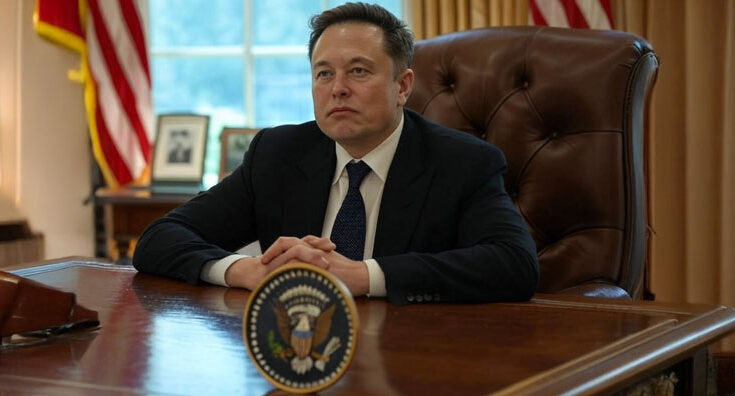You’ll find that Elon Musk’s been a naturalized U.S. citizen since 2002, having completed Form N-400 under INA § 316 after maintaining lawful permanent resident status for five years per 8 CFR § 316.5.
He’s retained his South African (jus soli) and Canadian (jus sanguinis) citizenships, creating triple nationality status recognized by the State Department. His citizenship’s critical for SpaceX’s federal contracts under 10 U.S.C. § 2536 and ITAR compliance. There’s much more to the impact of his immigration journey.
Elon Musk’s Path From South Africa to American Citizenship
Born in Pretoria, South Africa, on June 28, 1971, Elon Reeve Musk held South African citizenship by birthright under the South African Citizenship Act of 1949. You’ll find his journey exemplifies the American Dream through legal immigration channels. At 17, he emigrated to Canada via his mother’s Canadian citizenship, obtaining status through the Canadian Citizenship Act.
In 1992, Musk transferred to the University of Pennsylvania on an F-1 student visa. Following graduation, he secured H-1B sponsorship from Zip2 Corporation. After meeting continuous residence requirements under 8 U.S.C. § 1427(a), Musk filed Form N-400 in 2002. He passed the naturalization test, took the Oath of Allegiance, and received his Certificate of Naturalization, completing South Africa’s transition to America through proper legal procedures.
The Timeline of Musk’s Immigration Journey to the United States
When examining Musk’s immigration timeline, you’ll notice his methodical progression through U.S. immigration law began with his August 1992 entry on an F-1 visa under 8 C.F.R. § 214.2(f). Born in South Africa, Musk’s family background included Canadian citizenship through his mother, facilitating his initial North American migration in 1989. His early education at Queen’s University preceded his U.S. transfer to the University of Pennsylvania.
You’ll find his immigration process followed standard protocols: F-1 student status (1992-1995), H-1B employment authorization (1996), permanent residency via Form I-140 (1997), and naturalization through Form N-400 (2002). Each phase required compliance with USCIS regulations, including maintaining lawful status under INA § 245(a) and meeting physical presence requirements per 8 U.S.C. § 1427(a).
Musk’s Triple Citizenship Status and What It Means
Since acquiring U.S. citizenship through naturalization in 2002, Musk’s maintained triple citizenship status across South Africa (jus soli), Canada (jus sanguinis via maternal lineage), and the United States (naturalization under 8 U.S.C. § 1427).
You’ll find that neither South Africa’s Citizenship Act 88 of 1995 nor Canada’s Citizenship Act R.S.C. 1985 prohibits dual nationality retention. The U.S. State Department’s Foreign Affairs Manual (7 FAM 081) acknowledges multiple citizenship acquisition through birth circumstances or naturalization processes.
Musk’s global identity reflects permissible concurrent allegiances under respective national laws. His triple citizenship enables unrestricted travel between jurisdictions, though you should note that tax obligations under 26 U.S.C. § 61 apply to worldwide income regardless of residency location.
Legal Requirements and Process for Obtaining US Citizenship
Before you’re eligible to naturalize as a U.S. citizen under 8 U.S.C. § 1427, you’ll need to satisfy five fundamental requirements: lawful permanent resident status for at least five years (three if married to a U.S. citizen per 8 U.S.C. § 1430), continuous residence per 8 CFR § 316.5, physical presence totaling 30+ months within the statutory period, demonstrated good moral character under INA § 101(f), and English language proficiency plus civics knowledge per 8 CFR § 312.1.
The naturalization process begins with Form N-400 submission to USCIS. You’ll undergo biometric screening per 8 CFR § 103.16, followed by an interview where you’ll complete English and civics examinations. Upon approval, you’ll take the Oath of Allegiance pursuant to 8 CFR § 337.1, formally completing citizenship requirements.
Why Musk’s Citizenship Status Matters for Business and Politics
Musk’s U.S. citizenship directly impacts his eligibility for federal contracts under 10 U.S.C. § 2536 and ITAR compliance per 22 CFR § 120.15, as foreign nationals face restrictions on accessing controlled technical data and participating in certain government programs.
You’ll find his citizenship status determines SpaceX’s ability to secure NASA contracts worth billions and access classified defense technologies under DFARS 252.204-7000.
Without citizenship, he’d face barriers to Pentagon advisory roles and restricted access to critical infrastructure projects, limiting both corporate growth and policy-shaping capabilities.
For viewers interested in following related developments, interviews, or documentaries, platforms like IPTV often feature coverage on high-profile tech figures and geopolitical implications.
Frequently Asked Questions
Can Elon Musk Run for President of the United States?
You can’t run for president unless you’re a natural-born citizen per Article II, Section 1, Clause 5. Presidential eligibility mandates this constitutional citizenship requirement. If you’re naturalized like Musk, you’re constitutionally barred from candidacy.
Has Musk Ever Renounced Any of His Citizenships?
You’ll find no public records indicating Musk’s renunciation of citizenship status. Under INA §349(a), dual nationality holders must formally renounce through State Department procedures. Without filed CLN documentation, he’d retain South African-Canadian-American citizenship.
Do Musk’s Children Automatically Have Multiple Citizenships?
Under citizenship laws governing dual nationality acquisition, you’d need to examine each child’s birthplace and parents’ nationalities per respective countries’ statutes (8 U.S.C. §1401, Canadian Citizenship Act). Automatic transmission depends on specific jurisdictional requirements.
Which Passport Does Musk Use When Traveling Internationally?
You can’t access Musk’s travel documents through public records (Privacy Act, 5 U.S.C. §552a). International travel passport selection remains confidential per State Department regulations. Dual citizens typically choose passports based on destination-specific visa requirements.
Does Musk Pay Taxes in All Three Countries?
You’ll find tax obligations depend on the international earnings’ source and residence status. Without reviewing Musk’s specific filings (Form 1040, Schedule B), you can’t determine his compliance across jurisdictions per IRC §61 and applicable treaties.










